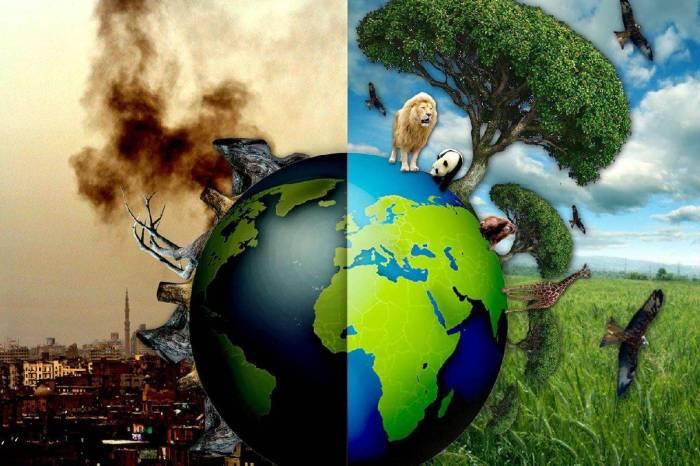UOT 327; 930.22
https://doi.org/10.30546/3006-0346.2024.6.84.018
Məhəbbət Seyidova
Bakı Dövlət Universitetinin
Beynəlxalq münasibətlər kafedrasının
doktorantı
E-mail: [email protected]
The EU Green Deal
SUMMARY
The development of the global economy has led to environmental degradation. The need to develop a new paradigm for sustainable economic growth became clear. The economic development of the green economy is a new type of economic development that produces social development, environmental protection and inclusive production for all. In the transition to a green economy, it is developing with many people to enter over finance and technology. Europe's high-tech economies are making the transition to a green economy. A developing economy recognizes the need for transformation, but the structure of their economies allows in many cases the purchase, processing and export of raw materials. This fact makes it difficult for these countries to meet modern carbon emission requirements. The European "Green Deal" is not only a tool to protect the environment, but also to protect the trade of European companies in international trade.
The European Union (EU) Green Deal is a plan to decarbonise the EU economy by 2050, structurally transform the EU's energy system, deeply transform the economy and step up efforts to combat climate change. But the plan will also have deep geopolitical consequences. The "Green Deal" will affect EU energy carriers and global markets, oil and gas producing countries neighboring the EU, Europe's energy security and, in particular, global trade patterns through the cross-border carbon regulation mechanism. Some of these changes are likely to have a negative impact on the economies of partner countries. The EU must fully understand and consider the consequences of its internal actions for the international context. He must be ready to handle the geopolitical aspects of the Green Deal. Building relationships with key neighbors such as Russia and Algeria, as well as global players including the US, China and Saudi Arabia, should be a key focus. The required efforts can be structured around some main areas of action: 1. Helping neighboring oil and gas exporting countries cope with the consequences of the Green Deal. There is a need to work with these countries to diversify their economies, including renewable energy and green hydrogen that can be exported to the EU in the future. 2. Increase the security of raw materials and reduce dependence on China in the first place. Key measures include diversifying supply, increasing recycling and developing alternatives for critical materials. 3. Collaborate with the United States and other partners to create a "climate club" whose members are willing to implement mechanisms such as transboundary carbon regulation.
Keywords: Green economy, economic security, the EU Green deal, geopolitical importance of green economy.
Xülasə
Qlobal iqtisadiyyatın inkişafı ətraf mühitin deqradasiyasına səbəb olmuşdur. Dayanıqlı iqtisadi artım üçün yeni paradiqmanın işlənib hazırlanması zərurəti aydın oldu. Yaşıl iqtisadiyyat iqtisadi inkişafın, sosial inkişafın, ətraf mühitin mühafizəsini və hamı üçün inklüziv inkişafı ehtiva edən yeni iqtisadi inkişaf növüdür. Yaşıl iqtisadiyyata keçid zamanı ölkələr maliyyə və texnologiya çatışmazlığı da daxil olmaqla bir çox problemlərlə üzləşirlər. Avropanın yüksək texnologiyalı iqtisadiyyatları yaşıl iqtisadiyyata keçidə rəhbərlik edir. İnkişaf etməkdə olan ölkələr yaşıl transformasiyaya ehtiyac olduğunu dərk edirlər, lakin onların iqtisadiyyatlarının strukturu bir çox hallarda xammalın çıxarılması, emalı və ixracına əsaslanır. Bu fakt bu dövlətlərin müasir karbon emissiya tələblərinə cavab verməsini çətinləşdirir. Avropa “Yaşıl Sövdələşməsi” təkcə ətraf mühitin qorunması cəhdi deyil, həm də beynəlxalq ticarətdə Avropa şirkətlərinin rəqabət qabiliyyətini qorumaq üçün bir vasitədir.
Avropa İttifaqının (Aİ) “Yaşıl Sövdələşməsi” 2050-ci ilə qədər Aİ iqtisadiyyatını karbonsuzlaşdırma, Aİ-nin enerji sistemini struktur olaraq dəyişdirmək, iqtisadiyyatı dərindən transformasiya etmək və iqlim dəyişikliyi ilə mübarizə səylərini artırmaq planıdır. Amma planın dərin geosiyasi nəticələri də olacaq. “Yaşıl Sövdələşmə” Aİ-nin enerjidaşıyıcılarına və qlobal bazarlara, Aİ-yə qonşu olan neft və qaz hasil edən ölkələrə, Avropanın enerji təhlükəsizliyinə və xüsusilə də transsərhəd karbon tənzimlənməsi mexanizmi vasitəsilə qlobal ticarət modellərinə təsir göstərəcək. Bu dəyişikliklərin bəzilərinin tərəfdaş ölkələrin iqtisadiyyatına mənfi təsir göstərməsi ehtimalı var. Aİ öz daxili fəaliyyətlərinin beynəlxalq kontekst üçün nəticələrini tam anlamalı və nəzərə almalıdır. O, “Yaşıl Sövdələşmə”nin geosiyasi aspektlərini idarə etməyə hazır olmalıdır. Rusiya və Əlcəzair kimi əsas qonşularla, eləcə də ABŞ, Çin və Səudiyyə Ərəbistanı da daxil olmaqla qlobal oyunçularla əlaqələrin qurulması əsas diqqət mərkəzində olmalıdır. Tələb olunan səylər bir neçə əsas fəaliyyət sahəsi ətrafında strukturlaşdırıla bilər: 1. Neft və qaz ixrac edən qonşu ölkələrə “Yaşıl Sövdələşmə”nin nəticələrinin öhdəsindən gəlməyə kömək etmək. Gələcəkdə Aİ-yə ixrac oluna biləcək bərpa olunan enerji və yaşıl hidrogen daxil olmaqla, iqtisadiyyatlarını şaxələndirmək üçün bu ölkələrlə işləməyə ehtiyac var. 2. Xammal ehtiyatlarının təhlükəsizliyini artırmaq və ilk növbədə Çindən asılılığı azaltmaq. Əsas tədbirlərə təchizatın diversifikasiyası, təkrar emalın artırılması və kritik materiallar üçün alternativlərin hazırlanması daxildir. 3. Üzvləri transsərhəd karbon tənzimlənməsi kimi mexanizmləri həyata keçirməyə hazır olan “iqlim klubu” yaratmaq üçün Amerika Birləşmiş Ştatları və digər tərəfdaşlarla əməkdaşlıq etmək.
Açar sözlər: Yaşıl iqtisadiyyat, iqtisadi təhlükəsizlik, Aİ yaşıl sövdələşmə, yaşıl iqtisadiyyatın geosiyasi əhəmiyyəti.




